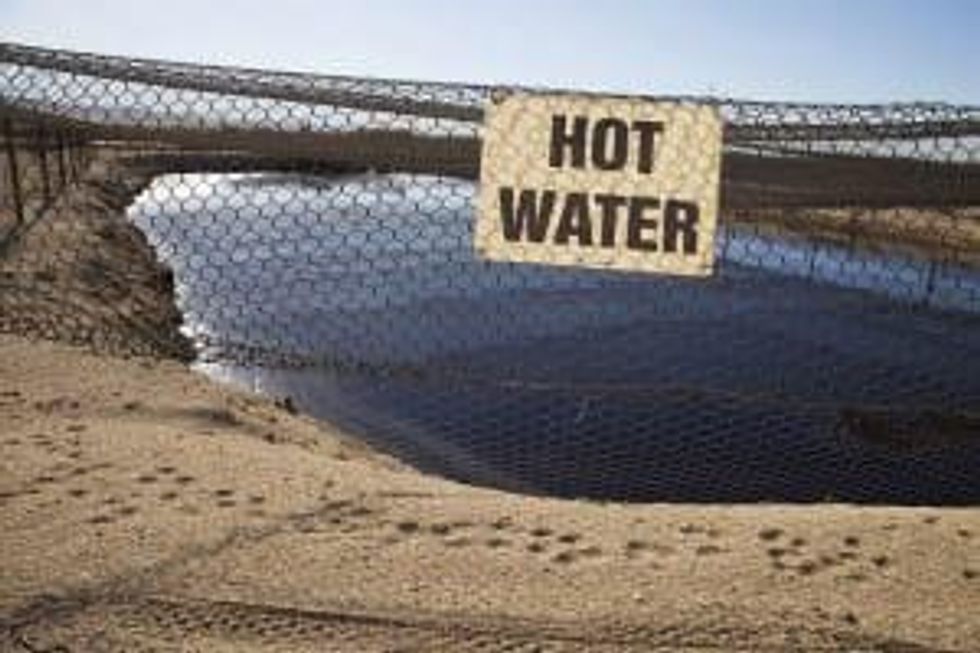March, 22 2016, 11:30am EDT
For Immediate Release
Contact:
Mark Kastel, Cornucopia Institute, 608-625-2042
Mark Westlund, Sierra Club, 415-977-5719
Environmental Advocates and Organic Industry Watchdog Ask USDA to Ban Use of "Produced" Wastewater from Oil and Gas Exploration in Organics
The Sierra Club and The Cornucopia Institute have formally called upon the USDA to tighten federal regulatory standards to prohibit the use of "produced water," which is wastewater from oil and gas drilling operations, in organic food production. The two organizations have simultaneously sent nearly 30,000 signatures to the agency calling for a ban on this potentially toxic water source.
SAN FRANCISCO
The Sierra Club and The Cornucopia Institute have formally called upon the USDA to tighten federal regulatory standards to prohibit the use of "produced water," which is wastewater from oil and gas drilling operations, in organic food production. The two organizations have simultaneously sent nearly 30,000 signatures to the agency calling for a ban on this potentially toxic water source.
The environmental group and the organic food and farming watchdog pointed to research that shows that this wastewater, a by-product of gas and oil exploration and production, is contaminated with toxic chemicals, radioactive salts, heavy metals and hydrocarbons, even when treated and diluted.
"Consumers buy organic produce to support sustainable agriculture that doesn't use toxic chemicals," states Alexander Rony, Sierra Club's Senior Digital Innovation Campaigner. "Oil wastewater puts the entire organic system at risk. If you can't be sure what's in your organic fruits and vegetables, what food can you trust?"
"Because it commonly contains similar contaminants, spreading sewage sludge is explicitly banned in organic production," said Mark A. Kastel, Senior Farm Policy Analyst at The Cornucopia Institute. "To keep organic food as pure as possible it's important that we promptly promulgate regulations that will ban the use of potentially hazardous wastewater in organic production."
New regulations are especially critical in California, where this practice has become particularly compelling to parched water districts. In the San Joaquin Valley, oil and gas drilling occurs near - and sometimes on - active farmland. With continued drought forecast across the West, more farmers are likely to turn to irrigation water from oil and gas production.
One example is the oil giant Chevron supplying California's Cawelo Water District with treated, produced wastewater from its oil fields since the mid-1990s. Several major farming operations and food brands are among the water district's customers, including Sunview which sells organic grapes and raisins as well as other produce.
 |
Source: Faces of Fracking |
"Recycled and treated oil or gas wastewater used for irrigation can be contaminated by a variety of toxic chemicals, including industrial solvents such as acetone and methylene chloride, and hydrocarbons (oil components)," said Jerome Rigot, PhD, a staff scientist at Cornucopia.
Rigot continued, "As an example, testing by Scott Smith, chief scientist for the advocacy group Water Defense, of the irrigation water provided by Chevron was shown to contain a multitude of contaminants, ranging from several polycyclic aromatic hydrocarbons (PAHs), various volatile organic compounds (VOCs) such as benzene, toluene, xylenes and acetone, methylene chloride, several hydrocarbons, high concentration of sodium chloride (table salt), other halide salts (bromide, fluoride, chloride), heavy metals, and radioactive metals (2 radium isotopes). Many of these compounds are potential and known carcinogens." Chevron denied using acetone or methylene chloride in its oil extraction process; however, the company refused to disclose the fluids used in drilling or well maintenance.
Fossil fuel industry lobbyists have succeeded in preventing the public from knowing what chemicals are being used in the oil and gas production wells. Although California has tougher disclosure requirements, current testing requirements are viewed by environmental groups, such as the Sierra Club, as wholly inadequate, focusing primarily on issues that could affect crop growth, such as salinity and boron, instead of risks to the environment, animals, and human health.
"This is a wake-up call that the organic standards need to be tightened," added Kastel. "While we are waiting for the USDA to take action, a little research to know where your organic food is coming from will pay dividends."
Cornucopia states that the vast majority of family-scale organic farms around the country do not use any questionable or potentially hazardous irrigation water. The families that farm these operations are eating the food out of their own fields, unlike the owners of large industrial operations, who commonly produce both organic and conventional produce, and which typically work under contract for a major agribusiness.
"By eating as close to home as possible, and buying food that is labeled both local and certified organic, consumers are getting the freshest and most nutritious food possible, as well as protecting their families from products made with crops grown by industrial-scale operations that are more likely to use unsafe practices," said Kastel. "For larger national brands, consumers can contact companies and ask if their irrigation districts use any processed wastewater."
Current organic standards already prevent petroleum-based fertilizers, sewage sludge-based fertilizers, and synthetic pesticides from being applied to organic crops. "Considering the health concerns and lack of clear science, a ban on treated oil and gas wastewater is prudent to protect consumers as well as the integrity of the organic food label," concludes the Sierra Club's Rony.
The Cornucopia Institute, a Wisconsin-based nonprofit farm policy research group, is dedicated to the fight for economic justice for the family-scale farming community. Their Organic Integrity Project acts as a corporate and governmental watchdog assuring that no compromises to the credibility of organic farming methods and the food it produces are made in the pursuit of profit.
LATEST NEWS
'A Forceful Stand for Our Constitution': Judge Orders Release of Kilmar Ábrego García
Judge Paula Xinis found that the Trump administration redetained the Salvadoran father of three "without lawful authority."
Dec 11, 2025
A federal judge on Thursday ordered the immediate release of Kilmar Ábrego García—who was wrongfully deported to El Salvador by the Trump administration earlier this year—from US Immigration and Customs Enforcement custody.
"Since Ábrego García's return from wrongful detention in El Salvador, he has been redetained, again without lawful authority,” US District Judge Paula Xinis wrote in her ruling. “For this reason, the court will grant Ábrego García's petition for immediate release from ICE custody.”
In early April, Xinis—an appointee of former President Barack Obama—ordered the Trump administration to facilitate Ábrego García's return to the United States after he was deported in March to the abuse-plagued Terrorism Confinement Center (CECOT) maximum security prison in El Salvador. This, after the US Department of Justice (DOJ) admitted in a court filing that Ábrego García was wrongfully deported due to what it called an "administrative error."
The US Supreme Court also weighed in on the case in favor of Xinis' ruling. However, the Trump administration refused to comply with the judge's order, arguing that it had no legal obligation to return Ábrego García to the US and could not force El Salvador's government to free him.
The DOJ dubiously contended that Ábrego García—a 30-year-old Salvadoran father of three who entered the US without authorization when he was a teenager—was a member of the gang MS-13, an allegation based on a statement from an anonymous police informant. The Trump administration deported him despite a judge's 2019 ruling that he could not be removed to El Salvador because he could be tortured there.
An attorney representing Ábrego García said at the time that his client suffered beatings and "psychological torture" while imprisoned at CECOT.
Ábrego García was transferred to a lower security Salvadoran prison before being sent back to the US on June 6 to face DOJ charges for allegedly transporting undocumented immigrants, to which he pleaded not guilty. He was immediately taken into custody and sent to an immigration detention facility in Tennessee.
On July 23, federal Magistrate Judge Barbara Holmes in Tennessee ruled that Ábrego García must be released from custody pending his trial. That same day, Xinis issued a simultaneous ruling in Ábrego García's wrongful deportation case blocking ICE from immediately seizing him once released in Tennessee and ordering the government to provide at least 72 hours' notice before attempting to deport him to any third country.
As Ábrego García was released on August 22, the US Department of Homeland Security (DHS) informed him that he could be deported to Uganda—one of several nations to which the administration has sought to send him. A bid by Ábrego García to reopen a previous bid for asylum in the US was denied in early October by an immigration judge.
Ábrego García is currently being held in an immigration detention center in Pennsylvania. Responding to Xinis' latest ruling, DHS spokesperson Tricia McLaughlin said Thursday that "this is naked judicial activism by an Obama-appointed judge."
"This order lacks any valid legal basis and we will continue to fight this tooth and nail in the courts," she added.
Advocates for Ábrego García welcomed Thursday's ruling.
"For months, the Trump administration has sought to deny Kilmar Ábrego García his rights to due process and fair treatment by our justice system," US Sen. Chris Van Hollen (D-Md.)—who met with Ábrego García in El Salvador in April—said on social media.
"Today’s ruling by Judge Xinis—requiring the government to immediately release him—is a forceful stand for our Constitution and all of our rights," he added.
Lydia Walther-Rodríguez, chief of organizing and leadership at CASA, hailed what she called "a moment of joy and relief."
“Kilmar finally gets to return home to his family, where he belongs," she said. "No one should be separated from their loved ones while fighting for justice.”
Keep ReadingShow Less
How the Past 25 Years of Big Oil's Lie-Filled Ads Have Delivered 'Climate Catastrophe'
"Big Oil's climate deception has evolved from lying about the problem to lying about solutions," said the head of the Center for Climate Integrity.
Dec 11, 2025
A group that supports communities' efforts to hold Big Oil accountable for decades of deception related to the climate emergency released a report on Thursday after reviewing more than 300 advertisements from four fossil fuel giants since 2000.
Over the past decade, people across academia, civil society, Congress, and journalism have examined the evolving lies of oil and gas giants, which have long been accused of using Big Tobacco's playbook.
"Using evidence from congressional investigations, advertising, and public relations documents, independent journalism, and watchdog reports," the new analysis states, "Big Oil's Deceptive Climate Ads explains how the pervasive and misleading messaging in BP, Chevron, ExxonMobil, and Shell’s advertisements has not only misrepresented the companies' business practices, but, over the span of two and a half decades, effectively cultivated a larger, deceptive narrative that oil and gas companies are leaders in the fight against climate change, when in fact they are actively fueling climate catastrophe around the globe."
The Center for Climate Integrity (CCI) report notes that "while oil and gas companies and their trade associations publicly denied the risks and realities of climate change for decades, growing public understanding of climate science around the turn of the 21st century eventually meant that outright denial was no longer sufficient to protect their bottom line."
NEW: For 25 years, four oil giants sold false climate promises through deceptive ad campaigns.Our report examined 300+ ads from BP, Chevron, Exxon, and Shell from 2000-2025. Together they push a false narrative that Big Oil is leading climate solutions. In reality, they're fueling catastrophe.
[image or embed]
— Center for Climate Integrity (@climateintegrity.org) December 11, 2025 at 8:54 AM
"During this period, major oil and gas companies began to reposition themselves publicly as active partners in the fight against climate change, even while they continued to increase fossil fuel production, invest minimally in clean energy, oppose energy efficiency initiatives, and promote technically or economically infeasible solutions," the document details.
"To convey this misleading image to the public," the publication continues, "Big Oil companies carried out extensive advertising campaigns, inundating the public with messaging that creates an overall deceptive portrait of their true role in the climate crisis."
CCI sorted the ads across seven categories of deception: emissions reductions, renewables investments, individual action, natural gas, carbon capture and storage, hydrogen, and algae biofuels. The group found that "these skillfully crafted advertisements often include partially truthful statements but omit relevant contextual information to create an inaccurate or incomplete representation of the initiative, product, or technology they promote."
"For instance, advertisements that portray natural gas as beneficial for the climate because it 'lowers emissions' are misleading by omission, because although gas produces less CO2 and other pollutants than coal when burned, it still emits significant quantities of greenhouse gases, including CO2 and methane, that pose a serious threat to the climate," the publication points out. "This tactic, known as paltering, has been at the core of Big Oil companies' climate advertisements for the past 25 years."

The report also acknowledges the public response: "Market research shows BP's 'Beyond Petroleum' campaign increased brand favorability among US and UK audiences, leading viewers to associate the oil giant with efforts to reduce carbon emissions at a time when it was the largest producer of fossil fuels in the UK and North America. Chevron's 'Real Issues' campaign, which promoted its energy conservation initiatives and renewables investments, improved the company's reputation among ad-exposed audiences."
The publication comes as the climate emergency continues to worsen, with deadly impacts, and world leaders fail to take adequate steps toward "a just, equitable, fossil-free future." Meanwhile, communities continue to call for not only action to limit future global warming but also consequences for the big polluters that created the global crisis.
The report similarly concludes that "oil and gas companies—including BP, Chevron, ExxonMobil, and Shell—must be held accountable for the damages their deception has caused. As climate accountability lawsuits filed by communities across the US make their way through the courts, ongoing advertising deception by the four oil majors' in this report demands further scrutiny and investigation."
CCI president Richard Wiles echoed that demand in a Thursday statement: "Big Oil's climate deception has evolved from lying about the problem to lying about solutions. For two-and-a-half decades now, these companies have sold the public a false and misleading image of their industry as working to solve the climate crisis, all while doubling down on fossil fuels and making the problem worse."
According to Wiles, "Any business that floods consumers with such brazenly deceptive advertising must be held accountable."
Keep ReadingShow Less
'Why Is This Hard?' Schumer Won't Say He Opposes Regime Change in Venezuela
"Twenty-five years ago, Chuck Schumer and Susan Collins both voted to send me and friends to kill and die in Iraq," said US Senate candidate Graham Platner. "Apparently neither of them have learned a thing."
Dec 11, 2025
US Rep. Ro Khanna suggested on Thursday that the top Democrat in the Senate had offered the latest evidence that the party needs "a new generation to lead... with moral clarity and conviction" after Sen. Chuck Schumer refused to denounce the Trump administration's threats of regime change in Venezuela.
"Why is this hard?" asked Khanna (D-Calif.) after Schumer (D-NY), the Senate minority leader, told CNN's Jake Tapper Wednesday evening that "everyone would like" it if Venezuelan President Nicolás Maduro "would flee on his own" instead of stating that the US should not try to force out the South American leader.
When asked point-blank if he disagrees with President Donald Trump's "ultimate goal of regime change in Venezuela," Schumer turned his focus to the lack of clarity in the White House's strategy.
"The bottom line is President Trump throws out so many different things in so many different ways. You don't even know what the heck he's talking about. You know, obviously, if Maduro would just flee on his own, everyone would like that. But we don't know what the heck he's up to when he talks about that," said Schumer. "You cannot say I endorse this, I endorse that when Trump is all over the lot, not very specific and very worrisome at how far he might escalate."
Chuck Schumer won't say if he opposes regime change in Venezuela.
JAKE TAPPER: Do you disagree with President Trump's ultimate goal of regime change in Venezuela?
CHUCK SCHUMER: Look, the bottom line is President Trump throws out so many different things in so many different… pic.twitter.com/kwjWMsBgM8
— Ken Klippenstein (NSPM-7 Compliant) (@kenklippenstein) December 10, 2025
Schumer's response, Khanna suggested, should have been: "Yes, Democrats oppose regime change war in Venezuela. Instead of wasting trillions on endless wars, we must invest in jobs, healthcare, and housing for Americans."
The CNN interview took place hours after the US military seized an oil tanker off the coast of Venezuela in what one think tank called an "illegal" escalation. In recent weeks Trump has claimed he's ordered the airspace above and around Venezuela closed—an action experts said he had no legal authority to take—authorized covert CIA action in the country, and this week said the US plans to "hit ‘em on land very soon," threatening strikes against Venezuela as well as Mexico and Colombia.
The White House has aggressively pushed a narrative about the need to stop the trafficking of fentanyl from Venezuela—despite findings by the Drug Enforcement Administration and the United Nations that the country plays virtually no role in the flow of the drug into the US. At least 87 people have been killed in US military strikes on boats in the Caribbean and eastern Pacific since September—bombings that Defense Secretary Pete Hegseth and Trump have claimed without evidence have targeted "narco-terrorists," but which Latin American officials, the family of one victim, and legal experts have denounced as extrajudicial killings and homicide.
Trump has previously signaled a desire to take control of Venezuela's vast oil reserves.
On November 21, Trump reportedly spoke to Maduro in a phone call and offered him safe passage out of Venezuela if he abdicated power, in the most explicit confirmation that the administration is seeking regime change. A CBS/YouGov poll released two days later found that 70% of Americans oppose any military action in Venezuela.
Labor attorney Benjamin Dictor and Democratic US Senate candidate Graham Platner of Maine were among those who joined Khanna in condemning Schumer's refusal to unequivocally reject the goal of forcing Maduro out through military action.
"Chuck Schumer is so spineless he can’t even affirmatively oppose illegal, unauthorized regime change by military force," said Dictor.
Schumer has called for the passage of a war powers resolution to block the deployment of US forces in Venezuela. As Trump has continued the boat bombings and built up military presence in the Caribbean, two war powers resolutions aimed at stopping the US from striking boats and targets inside Venezuela have failed to pass.
But his refusal to speak out comes two months after journalist Aída Chávez reported that a "senior Democratic staffer" was "discouraging Democrats from coming out against regime change in Venezuela... arguing that opposing Trump and [Secretary of State Marco] Rubio's regime change amounts to supporting Maduro."
After Schumer's interview, Matt Duss of the Center for International Policy joined in calling for "regime change in the Senate Democratic Caucus."
Keep ReadingShow Less
Most Popular


